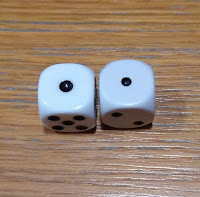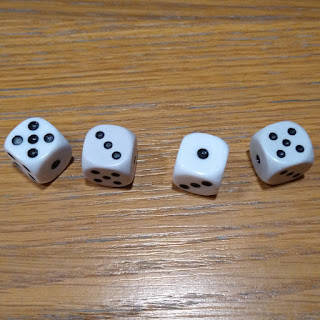I'm brainstorming ideas for a new game system. Initially, I called it the Hearts System, but that may change. I kind of like A Broken Hearts System or ABHS.
I am starting to formulate ideas for mechanics.
The first mechanic I created is generating characters using a standard (or custom) set of cards. I shared this in
a post a while ago but I will recap it here.
Aces are your abilities and they are laid out Spades, Diamonds, Clubs, and Hearts. I have retitled them Swords, Shields, Coins, and Hearts which correspond to:
(Swords) Fighting ability,
(Shields) Defensive abilities,
(Coins) Resources,
(Hearts) Life points.
Below them are the Kings, the Queens, and the Jacks. These cards map to three classes. Kings are Squares; Squares use brawn more than any other skill. Queens are Pures; Pures prefer to use their mental facilities over everything else. And Jacks are Semis, people who mix physical and mental facilities with ease.
In the following examples, we are using just Kings to build a Square character. I will write about Pures and Semis in a different post.
A starting player assigns one or more Kings to their four abilities. Once complete, the player looks down at each pile and totals them up, adding Kings and Aces together.
Swords: 3
Shields: 2
Coins: 1
Hearts: 2
All starting characters have distributed 8 cards (or points) among 4 stats.
Now, here is the first twist. Put the Shields over your Hearts, like so:
It is always Shields on Hearts and the stats are adjusted like this:
Swords: 3
Shields: 2
Coins: 1
Hearts: 2 (4)
Now this character is fit to fight. We need to talk about dice. This system assumes you'll use six siders and two. I took
a poll and this was what the hivemind thought was best. Of course, the hivemind can make its own games, so I will modify this two-die standard later on.
This is a roll-low game. The lower the better. Nothing special happens if you roll snake eyes. By the same standard, nothing special happens if you roll 2 sixes.
One of the quirks of this game is we only have two cases where we modify the die rolls directly. We'll handle that later.
If your Sword is 3, then you need to roll a 2 or a 3 to hit. Damn, that would be a tedious game. At this point, we need some modifiers on your character's skills. Remember, this is not modifying the die roll. We need the player to be aware of what they need to hit before rolling.
You get +1 for having a weapon, say a spear, and another point for each skill in skill you have. Since you have 3 Swords, you can learn up to three combat skills. In this case, let's make them 3 points or ranks with a spear. Now we have a total of 3+1+3=7.
See how we didn't add to the dice, but modified the ability to hit? The rationale behind this is all characters should know, roughly, their ability to strike something before they make that attack roll. Remember, I do have an exception to this no-modifier rule which will come into play later.
You must roll equal to or under a 7. Now that is more like it, there is a good chance of rolling that. Here is my modification on using two six-sided dice. We're gonna use more. In the first step or interval of combat, you roll 2d6 and compare it to your to-hit number which is 7.
We roll a four and hit. This removes one Shield or Heart from the opponent. There are only hits, we won't use damage dice. A very powerful creature might have 18 Shields and Hearts combined, but against a group of characters making a couple of attack rolls per combat turn, these defenses will go fast.
The next mechanic is the duration of the combat turn. We're calling each cycle of combat a turn and each one is 12 seconds long, divided into 2-second intervals or steps. Every character may take one action per step. BUT they can only attack once per unit Sword and only once per interval or step of the combat turn.
Our Square with a Spear can take three swipes with their weapon per combat turn because they only have 3 Swords. They are not skilled enough to do more. This is an inversion of D&D style rules as it assumes characters are pretty quick.
What does he do with the rest of his time? He can move, open doors, duck, dodge, or whatever. Basically anything other than sticking a spear in someone. He can move three times and attack three times. There will be cases where this particular character will move four times and attack twice, losing one attack because they ran out of time. Higher-level characters are entitled to swing every combat step or interval, but probably won't for... reasons.
Now we get the exception on modifying die rolls. Remember when you put your Shields on Hearts? If you get hit, you lose a Shield point. When they are gone, you start losing Hearts. When your Hearts are gone, you are down. Not dead, but down and unable or unwilling to stand back up.
Here is the modifier on die rolls. A character can choose to defend themselves instead of attacking. They can do this once per Heart, per opponent, per combat step, or interval. This adds to the attacker's die roll. The cost of doing this is, if you get hit, you lose the Heart you risked instead of the Shield.
Ouch! You can go down by making risky moves. By the same standard, if you successfully defend yourself, you lose nothing but that one attack. This also slows combat, kind of like casting from hit points in reverse.
If you are a numbers person, you'll realize that a minute of combat is 5 12-second combat intervals. Using our Square with the Spear, this could be 15 attack rolls in just 60 seconds. This would be really violent and quick, which is why I wanted to slow things with defense.
To slow this down more, I'll modify the number of dice thrown per combat interval or step. The first time you attack in a turn, you need to get a 7 or less on two dice. Assuming nothing changes, the second attack requires rolling 7 or less on 3 dice.

That spear is getting heavy and you are getting tired.
Guess what? The third attack requires throwing 7 or lower on four dice. This continues for each attack, a high-level character could be throwing 7 dice to hit on that sixth swing.
Also, it makes risking a Heart on Defense more worthwhile later in the combat turn.
This is a neat mechanic as new players will swipe at opponents very quickly while learning the combat system until they realize that maybe they should hold back a bit once they master it. The mechanic itself is simple, just add a die but your chances of hitting are plummeting. It also encourages players to work together, say having three guys up front taking turns at attacking an opponent, rather than everyone hacking away wildly.
At the end of the 12-second combat turn, there is a reset moment. Shields are restored at the start of every combat turn, but Hearts are not. If you started with two Shields and lost them to two blows from an opponent, you get them back for the next turn. This restoration isn't repairing a bit of armor or picking up a shield, but making an adjustment to the item itself or modifying their use against a specific opponent.
I hope you found this interesting. Next time I will get into missile combat and magic. Let me know what you think in the comments.



















